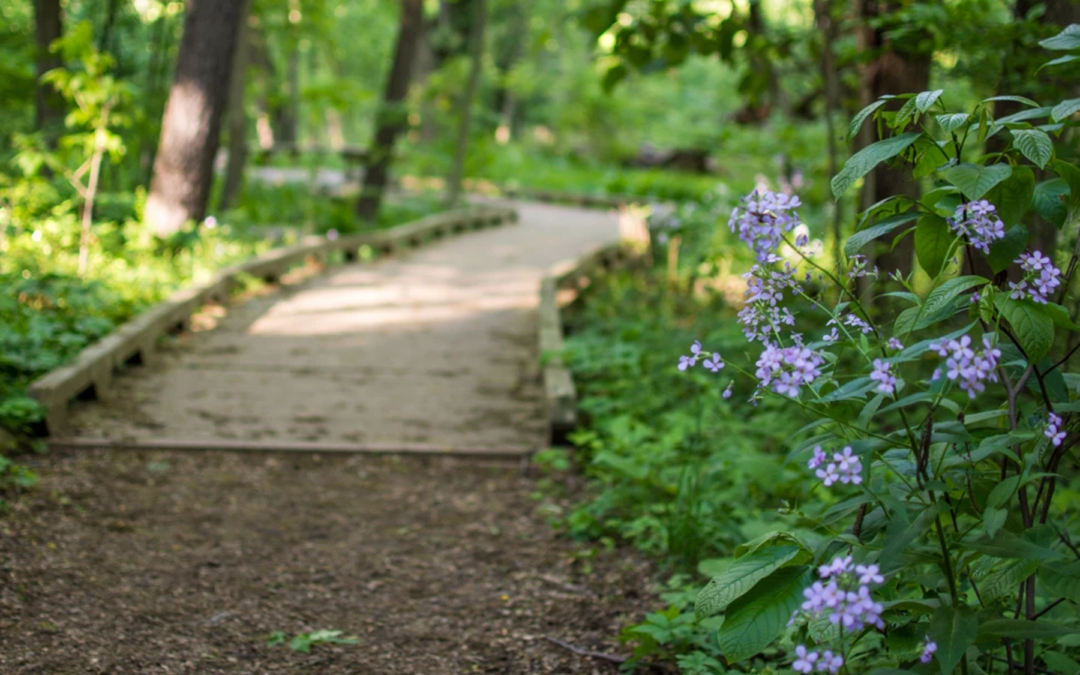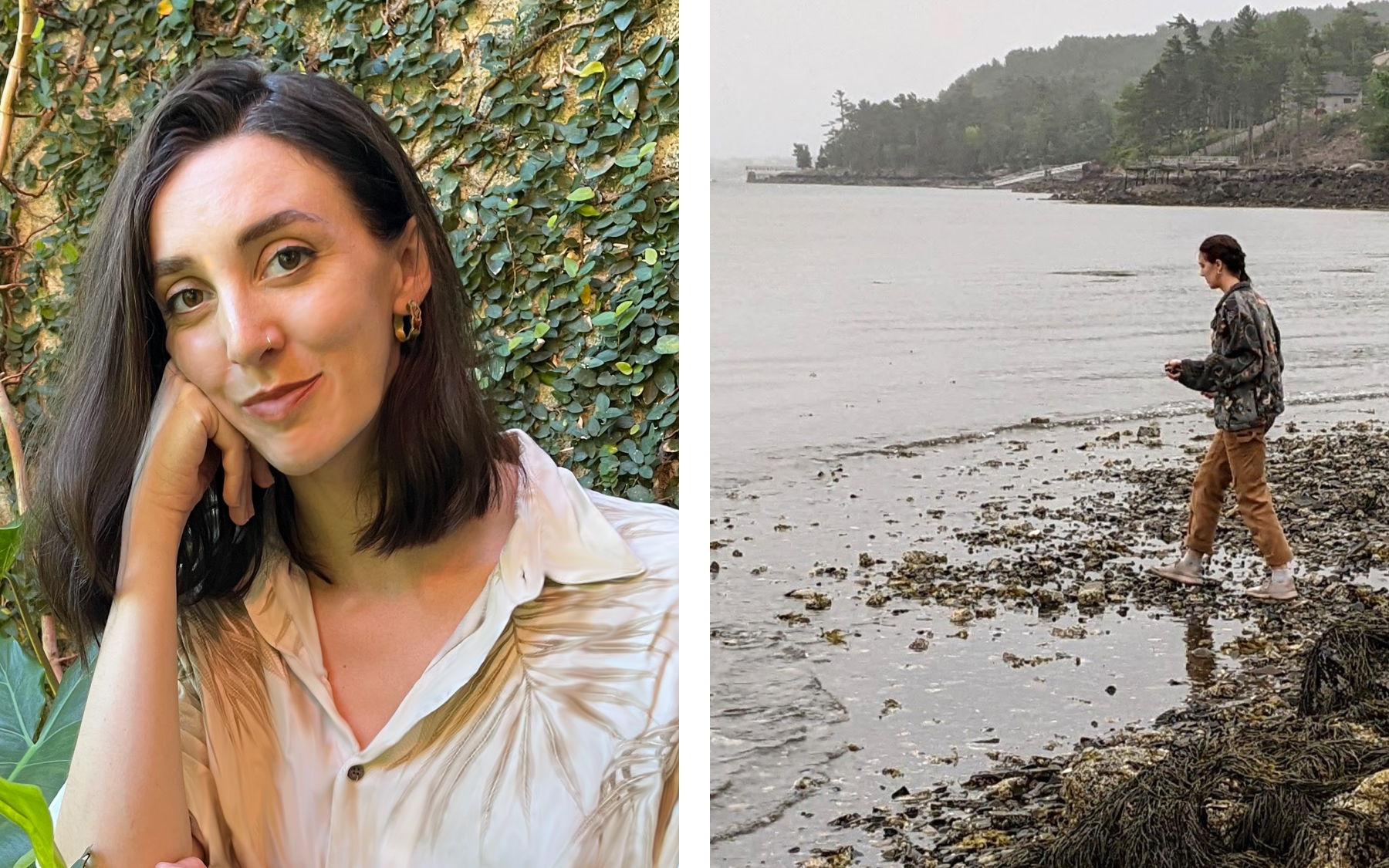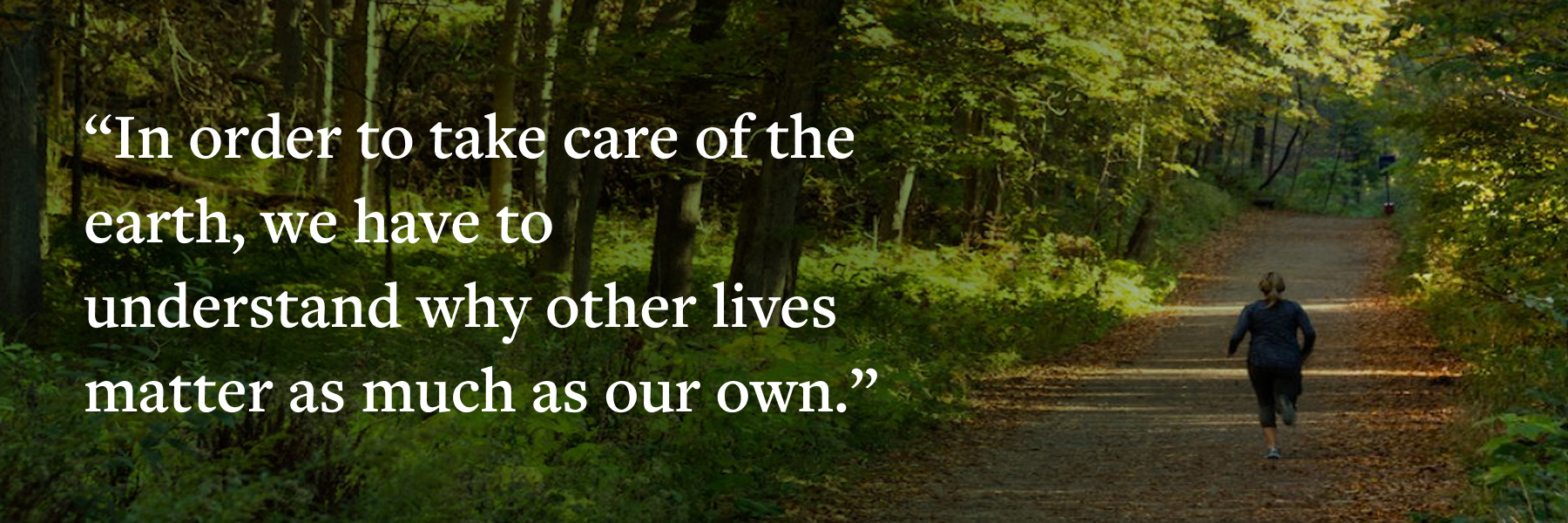Look outside your window or take a stroll. Pay attention to all the beings alive around you—the trees, the insects, the grasses, the birds. Think of the roots dormant beneath your feet and the life in the branches above.
Now, imagine the conversations taking place between these beings. Who is speaking? What are they saying? Write a poem with your answer.
The text above is a writing prompt by Caroline New, an artist, poet, and anthropologist who holds her M.F.A. in poetry from the University of Michigan and is currently a Rackham Ph.D. student in anthropology.
In 2023, New was one of three inaugural master’s degree–level residents for the Creative Careers Residency, a transitional program providing support for full-time, self-directed creative practice in architecture, art and design, performing arts, intermedia arts, or creative writing supported by the University of Michigan Arts Initiative. During the fall 2024 semester, New led outdoor meditative writing exercises and fireside poetry workshops as part of the Arts Initative’s Take Care series, supported by Wolverine Wellness.
Based on workshops that she created during her time as a graduate student instructor teaching poetry classes, New mapped out a loop around the Nichols Arboretum–often referred to simply as the Arb–and created stops in different landscapes for participants to receive writing prompts, including reflections on tree-to-tree communication and fractals. Participants, including faculty, staff, undergraduate students, graduate students, and postdoctoral fellows, spent time writing poetry at each spot, with the option of sharing their writing with the group.
“For each spot I had a writing prompt that offered a new perspective or way to think about that landscape around us,” she says. “It was great to see what people were most excited about in the Arb and what spurred their imaginations.”
Understanding the Natural World
Growing up in rural Georgia near the Florida border, New was fascinated by the natural world around her. Specifically, animals play a central role in her work across disciplines. Her anthropological studies began in undergrad when she encountered Reflections of Eden: My Years with the Orangutans of Borneo by anthropologist, primatologist, ethologist, and author Birutė Mary Galdikas.
“I found myself so enthralled by anthropology, by this new space where you can ask all these questions about what it means to be human,” New says.
After a study abroad trip to Madagascar during her undergraduate studies, New ended up moving back to the country after graduation to work as a middle and high school teacher as part of the Peace Corps. All was going well until the COVID-19 pandemic hit and American volunteers had to leave the country.
Fortunately for our campus community, New had applied to the U-M M.F.A. program in poetry and got in, bringing her to Michigan.
“Poetry is the backdrop for everything I do because it is the part of my work where I deal with the things I feel closest to. It feels foundational,” New says.
Currently, as a Ph.D. student in the anthropology department—and in her creative work—New is interested in how people imagine their environments.
“Whether something is endangered or invasive, we categorize it differently, we value it differently; it’s pets versus wild animals. I’m interested in how those imaginations came to be—and why we would consider some things worth caring about and some things not worth caring about,” she says.
To New, understanding how humans categorize the natural world is a vital part of mitigating the harm that humans cause to it.
“Figuring out how we can see the interconnectedness of ourselves with others is one of the only ways to incite the kind of empathy we need to make us care about protecting the world around us,” New says. “In order to take care of the earth, we have to understand why other lives matter as much as our own.”
Interdisciplinarity
While some people working across art, poetry, and anthropological research bring their work together through ethnography or textual paintings, for New the most productive intersection is a shared mindset.
“These disciplines are very related because they come from the same way of looking at the world, of taking something and turning it over and over and over, and making that thing more complicated rather than simplifying it. These disciplines help me see connections and develop an intimate kind of relationship with very small parts of our world people may not be paying attention to.”
Explore Caroline’s new book of poetry, A History of Half Birds (Milkweed Editions, 2024)
Explore U-M Arts Initiative Programming
How Rackham Helps
In 2021, New participated in a Rackham Student Research Grant funded project that brought musicians and visual artists to Montana and South Dakota for creative collaborations around the themes of wildfires and mining. The group led skill-share workshops for one another and created a lot of experimental, cross-disciplinary work.
“That trip was what empowered me to start learning new art forms—including film and a new instrument—and to think of what it means to collaborate across disciplines,” New says.
New also received a Conference Travel Award to attend the Association of Writers & Writing Programs in 2022.
“At the conference, I got to meet writers from around the country and attend panels on what it means to write poetry today.”
Love Poem For My Bird Dog
A poem by Caroline New, republished with permission.
I wanted to write a love poem, but it ended up
about my bird dog who wouldn’t hunt. Who only chased shadows
round and round the back field until we had to
tie him up. Then one day, he offered up
a mouth full of bird. I wanted to write
about the bird, but this is a love poem—
or it could have been if I wrote about
my yellow dog, who once bit my neighbor so badly
the police took her away for a month and my bird dog
stopped running circles. Stopped eating. Went blind
with missing her, despite the fact that yellow dog
never liked him, or even noticed when he died.
But this was meant to be a love poem, so maybe I should write
about my black horse, Daizy Mae, who was tall and fast and mean
to everyone but Sunny, the red horse who never left her side.
Never bit or kicked or broke down the fence to run
into the road unless she was following Daizy.
She was following Daizy when she climbed from the ditch
onto the highway, but being sweet and slow and
loyal, could not leap from the blacktop in time.
We found Daizy after the accident
down the road, chewing grass, unbothered.
Let me try again. The black horse. The red horse.
The dogs. Perhaps I will write this poem
to the bird I pulled from my dog’s mouth.
How I wrapped it in a washrag and laid it
in a shoebox, tapping its small chest for hours until
I had to accept it was dead. How I dug
a tiny grave, but when I reached for the body
it was gone. Maybe I am writing to the shadow
of the bird that my dog who wouldn’t hunt chased
again across the field. You, yes you—I need you
to know I would have kept you, and loved you
most, had you never escaped my hands.



